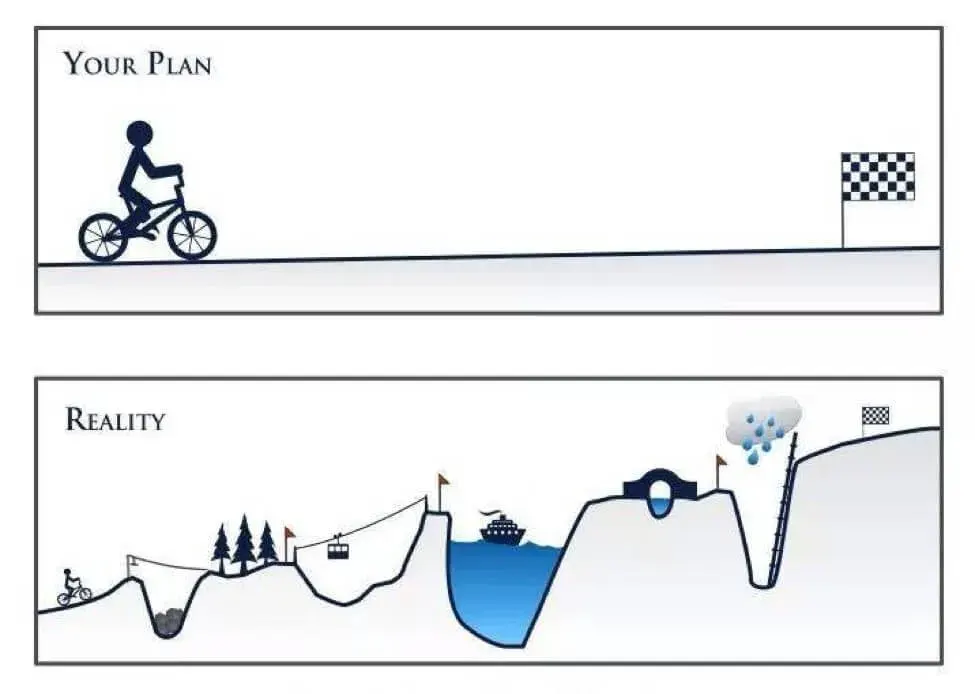Evaluation of managers’ skills is always a challenge. Sometimes, you see that the employee has a really good potential, nice background (education, soft skills, e.t.c.), relevant experience… But when I see the results of their work, I am sometimes very disappointed: my expectations can be very different from what I get and I cannot understand what went wrong.
My idea of management has been evolving throughout the years: I was gaining new experience, reading amazing books and talking to different people.
In this article, I’d like to make a few statements about what really matters for the managers from my point of view (please note that all of this is very subjective). You will be surprised because you won’t find any common statements. However, this paradigm perfectly fits the empirical data. Let’s go.
Be smart
That’s obvious but if you are not smart you can’t be a good manager. Seriously, if you have not spent years and years of your life on improving your brain, then you are out of the story.
It is not about soft skills like “communication”, “positive attitude”, “responsibility”, etc. It is all about how you think. I do not have the right answer on how to make your mind beautiful but I know a few elements: math + logic, solving non-standard problems (like Math/Physics Olympiad’ problems), a lot of research in Humanities & Social Sciences (history, art, literature), practical scholasticism applied to any problem, reading on and trying different philosophies, reading a lot of books (three to ten per week or maybe more), talking to smart people and learning, practicing rational thinking, listening to music (both classical and not), practicing mindfulness and so on (please don’t follow the STEM pattern — use at least STEAM).
You might wonder why I have not mentioned anything actually related to management. The short answer is: it is not important.
Seriously, if you want to understand the basics of modern management concepts you need 1–2 weeks to read a number of books. Then you need a few months of practice — and that’s it. Formally, management is a hard skill that can be easily mastered. It won’t make you better — it just adds some information into your brain.
A very short summary: management is an art, not a science.
A longer summary: forget about hard skills, forget about soft skills. Start improving your mind. Start reading. Start reading a lot. Don’t focus on “easy” books, try difficult ones. Start thinking & debating about whatever you want. Look for the cause, not for the effect.
Peace is a lie, there is only passion

That’s how the Code Of The Sith from Star Wars Universe (the Lucas’ one, not new glamour series) starts. Then it continues:
Through Passion I Gain Strength
A good manager needs passion. Without passion you are not a manager, you are just supervisor. And in this case, you will be soon replaced by predictive analytics and automation processes.
It is the passion that forces a manager to perform perfectly, not just well. Yes, everybody will fail because nobody is perfect, but the question is: has the manager done everything they could to avoid the failure?
Passion forces us to find the solution even if the first reaction is “it’s impossible”. Passion helps us find the third answer to a binary question. Passion gets you commitment, which is the holy grail of management. But commitment is not a primary skill. It follows if you have passion.
Short summary: you have to turn to the Dark Side when you are a manager.
Manage everyone’s expectations

What is the most important thing for a manager? Keep everything up-to-date? Manage the team? Organize the work? Setup & run the communication inside & outside of the team? No, no, and one more time no.
Of course, all of that above is important. But it is not the main thing. What is most important is very simple: manage the expectations of people.
- Manage the expectations of the stakeholder in order to be sure that the project is going in the right direction.
- Manage the expectations of each team member to avoid any communication lags. Also, manage their expectations about your role. Help them understand the expectations of others.
- Manage the expectations of your clients (in the case of product development). This part is the most difficult because you have to be all these people. You can’t simply ask a person “what are your expectations?”, it won’t work. You have to understand them.
How to do that? Again, I have no clear answers. However, I can provide a few ideas: — Improve your empathy. — Exercise with “transferring of your mind” to stakeholders and others. Try to understand how they are thinking and what are their goals. Try to understand their concerns and be proactive in to deal with any issues before they appear. — Be always a few steps ahead. It’s like a chess game: if you want to win you have to predict different scenarios and you need to have a plan for each of them.
Short summary: managing expectations is the key to the successful relationship between you and other people involved.
Don’t read too many books about management
Seriously, what do you want to find there? Answers? There are no answers.
Do you want to find success stories and repeat them? Sorry, but it’s the survival bias. There is almost no value in reading success stories, on the contrary — try to find the stories of failure.
The psychologist Carl Jung wrote in his memoirs that once as he was in India, a friend suggested him to visit an enlightened master. Jung said that there was no need because the Truth is unique and can’t be learned, only achieved.
The same can be applied to the management process. Don’t seek for the truth or success stories — learn yourself. Look for the stories of failure because they can show what you should not do.
Of course, there are a number of books that can be useful: how-to’s, practical-oriented texts (like Scrum & XP), classics (like Ichak Adizes), for you to be able to talk to others on the same language.
Summary
You might have noticed that the statements above look very abstract and there are no specific steps on what to do. I do agree: there is no clear path that could lead you to the success in the management field. However, I challenge you to reconsider the learning curve: there are so many books and so many stories but there are a few good managers. Why? If the current learning flow is the right one where are all these perfect managers?
I doubt that the current flow is right. I doubt that there is an algorithm that could make you perfect. I doubt that there is a theory that could explain that.
What I really think is that anyone who wants to be a perfect manager has to find their own path. This path is not defined, it is not written, it can only be achieved. And you have to improve yourself a lot in different areas because nobody knows what would be useful on this path.
“We ourselves must walk the path” © Buddha.
